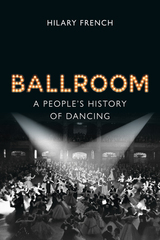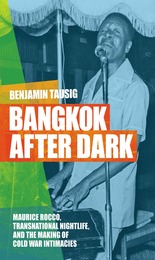
Revolutions and aborted revolutions and bitter civil and "local" wars in the 1980s and since have raised new questions about national security, its definition, and its implementation. Nevertheless, a number of basic philosophical and political issues remain constant at a level deeper than tactical considerations. These are what eight accomplished philosophers, political scientists, Christian ethicists, and policymakers came together to discuss. They ask the fundamental and perduring questions of pacifism, war, intervention, and political negotiation. They focus on such problems as ascertaining the role of the churches in the quest for peace, defining "national interest" and "national purpose," and construing intervention in other that strictly unilateral terms.
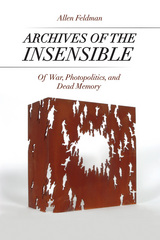
Excavating a scenography of trials—formal or covert, orchestrated or improvised, criminalizing or criminal—Feldman shows how the will to truth disappears into the very violence it interrogates. He maps the sensory inscriptions and erasures of war, highlighting war as a media that severs factuality from actuality to render violence just. He proposes that war promotes an anesthesiology that interdicts the witness of a sensory and affective commons that has the capacity to speak truth to war. Feldman uses layered deconstructive description to decelerate the ballistical tempo of war to salvage the embodied actualities and material histories that war reduces to the ashes of collateral damage, the automatism of drones, and the opacities of black sites. The result is a penetrating work that marries critical visual theory, political philosophy, anthropology, and media archeology into a trenchant dissection of emerging forms of sovereignty and state power that war now makes possible.
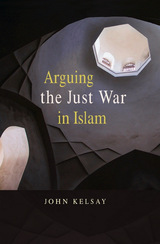
Jihad, with its many terrifying associations, is a term widely used today, though its meaning is poorly grasped. Few people understand the circumstances requiring a jihad, or "holy" war, or how Islamic militants justify their violent actions within the framework of the religious tradition of Islam. How Islam, with more than one billion followers, interprets jihad and establishes its precepts has become a critical issue for both the Muslim and the non-Muslim world.
John Kelsay's timely and important work focuses on jihad of the sword in Islamic thought, history, and culture. Making use of original sources, Kelsay delves into the tradition of shari'a--Islamic jurisprudence and reasoning--and shows how it defines jihad as the Islamic analogue of the Western "just" war. He traces the arguments of thinkers over the centuries who have debated the legitimacy of war through appeals to shari'a reasoning. He brings us up to the present and demonstrates how contemporary Muslims across the political spectrum continue this quest for a realistic ethics of war within the Islamic tradition.
Arguing the Just War in Islam provides a systematic account of how Islam's central texts interpret jihad, guiding us through the historical precedents and Qur'anic sources upon which today's claims to doctrinal truth and legitimate authority are made. In illuminating the broad spectrum of Islam's moral considerations of the just war, Kelsay helps Muslims and non-Muslims alike make sense of the possibilities for future war and peace.
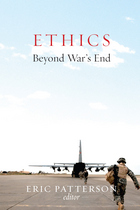
The wars in Afghanistan and Iraq have focused new attention on a perennial problem: how to end wars well. What ethical considerations should guide war’s settlement and its aftermath? In cases of protracted conflicts, recurring war, failed or failing states, or genocide and war crimes, is there a framework for establishing an enduring peace that is pragmatic and moral?
Ethics Beyond War’s End provides answers to these questions from the just war tradition. Just war thinking engages the difficult decisions of going to war and how war is fought. But from this point forward just war theory must also take into account what happens after war ends, and the critical issues that follow: establishing an enduring order, employing political forms of justice, and cultivating collective forms of conciliation. Top thinkers in the field—including Michael Walzer, Jean Bethke Elshtain, James Turner Johnson, and Brian Orend—offer powerful contributions to our understanding of the vital issues associated with late- and post conflict in tough, real-world scenarios that range from the US Civil War to contemporary quagmires in Afghanistan, the Middle East, and the Congo.
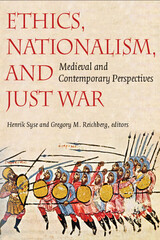

"This book began in an argument between friends surprised to find themselves on opposite sides of the debate about whether the United States and the United Kingdom should invade Iraq in 2003. Situated on opposite sides of the Atlantic, in different churches, and on different sides of the just war/pacifist fence, we exchanged long emails that rehearsed on a small scale the great national and international debates that were taking place around us. We discovered the common ground we shared, as well as some predictable and some surprising points of difference....When the initial hostilities ended, our conversation continued, and we felt the urgency of contributing to a wider Christian debate about whether and when war could be justified."—From the Preface
So began a dynamic collaboration that developed into a civil but provocative debate over matters of war and peace that is Faith and Force. From the ancient battles between Greek city-states to the Crusades to the World Wars of the twentieth-century to the present-day wars in Afghanistan and Iraq and the Middle East, aggressors and defenders alike have claimed the mantle of righteousness and termed their actions just. But can the carnage of war ever be morally grounded? And if so, how?
These are the questions that David L. Clough, a Methodist proponent of pacifism, and Brian Stiltner, a Catholic theologian and just war adherent, have vowed to answer—together. With one voice, Clough and Stiltner outline and clarify issues of humanitarian intervention, weapons proliferation, and preventative war against rogue states. Their writing is grounded in Christian tradition and provides a fresh and illuminating account of the complexities and nuances of the pacifist and just war positions.
In each chapter Clough and Stiltner engage in debate on the issues, demonstrating a respectful exchange of ideas absent in much contemporary political discourse—whether on television or in the classroom. The result is a well-reasoned, challenging repartee that searches for common ground within the Christian tradition and on behalf of the faithful promotion of justice—yet one that also recognizes genuine differences that cannot be bridged easily. Intended for a broad audience, Faith and Force is the perfect foil to the shrill screeching that surrounds partisan perspectives on military power and its use.
To help with using the book in a classroom context, the authors have provided Questions for Reflection and Discussion for each chapter. You can download these questions in PDF format at press.georgetown.edu.

Moral theologians, defense analysts, conflict scholars, and nuclear experts imagine a world free from nuclear weapons
At a 2017 Vatican conference, Pope Francis condemned nuclear weapons. This volume, issued after the 60th anniversary of the Cuban Missile Crisis, presents essays from moral theologians, defense analysts, conflict transformation scholars, and nuclear arms control experts, with testimonies from witnesses. It is a companion volume to A World Free from Nuclear Weapons: The Vatican Conference on Disarmament (Georgetown University Press, 2020).
Chapters from the perspectives of missile personnel and the military chain of command, industrialists and legislators, and citizen activists show how we might achieve a nuclear-free world. Key to this transition is the important role of public education and the mobilization of lay movements to raise awareness and effect change. This essential collection prepares military professionals, policymakers, everyday citizens, and the pastoral workers who guide them, to make decisions that will lead us to disarmament.
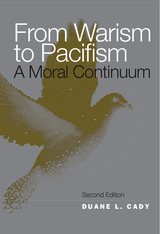
Duane Cady views warism and pacifism as polar extremes on a continuum that embraces a full spectrum of ethical positions on the morality of war and peace. Realizing that he could not intellectually defend the notions of just-war theory, he found that he was a reluctant pacifist. In this new edition of From Warism to Pacifism, Cady continues to expose the pervasive, subconscious warism that is the dominant ideology in modern Western culture. He explores the changes over the last twenty years—from the end of the Cold War to the ongoing “war on terror,” as well as Barack Obama winning the Nobel Prize for Peace.
Like racism and sexism, the uncritical presumption that war is morally justifiable, even morally required, misguides our attitudes and institutions. In its place, Cady proposes the development of a positive concept of peace. Citing common objections to pacifist values, he describes peace as something more than the mere absence of war and demonstrates that pacifism is a defensible position.
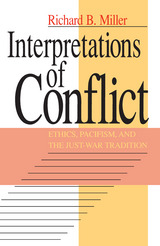
Miller's study of the ethics of war could not be more timely.
Miller brings together the opposed traditions of pacifism and
just-war theory and puts them into a much-needed dialogue
on the ethics of war.
Beginning with the duty of nonviolence as a point of
convergence between the two rival traditions, Miller provides
an opportunity for pacifists and just-war theorists to refine
their views in a dialectical exchange over a set of ethical
and social questions. From the interface of these two long-
standing and seemingly incompatible traditions emerges a
surprisingly fruitful discussion over a common set of values,
problems, and interests: the presumption against harm, the
relation of justice and order, the ethics of civil
disobedience, the problem of self-righteousness in moral
discourse about war, the ethics of nuclear deterrence, and
the need for practical reasoning about the morality of war.
Miller pays critical attention to thinkers such as Augustine
and Thomas Aquinas, as well as to modern thinkers like H.
Richard Niebuhr, Paul Ramsey, Martin Luther King, Jr., James
Douglass, the Berrigans, William O'Brien, Michael Walzer, and
James Childress. He demonstrates how pacifism and just-war
tenets can be joined around both theoretical and practical
issues.
Interpretations of Conflict is a work of massive
scholarship and careful reasoning that should interest
philosophers, theologians, and religious ethicists alike. It
enhances our moral literacy about injury, suffering, and
killing, and offers a compelling dialectical approach to
ethics in a pluralistic society.
Richard B. Miller is assistant professor of religious
studies at Indiana University.
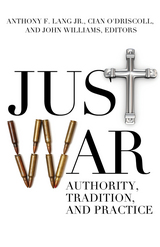
The just war tradition is central to the practice of international relations, in questions of war, peace, and the conduct of war in the contemporary world, but surprisingly few scholars have questioned the authority of the tradition as a source of moral guidance for modern statecraft. Just War: Authority, Tradition, and Practice brings together many of the most important contemporary writers on just war to consider questions of authority surrounding the just war tradition.
Authority is critical in two key senses. First, it is central to framing the ethical debate about the justice or injustice of war, raising questions about the universality of just war and the tradition’s relationship to religion, law, and democracy. Second, who has the legitimate authority to make just-war claims and declare and prosecute war? Such authority has traditionally been located in the sovereign state, but non-state and supra-state claims to legitimate authority have become increasingly important over the last twenty years as the just war tradition has been used to think about multilateral military operations, terrorism, guerrilla warfare, and sub-state violence. The chapters in this collection, organized around these two dimensions, offer a compelling reassessment of the authority issue’s centrality in how we can, do, and ought to think about war in contemporary global politics.
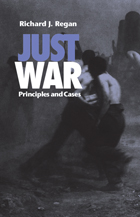
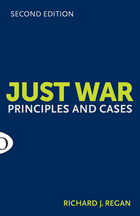
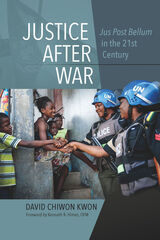
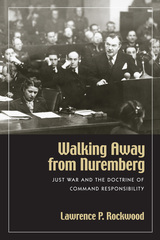

This volume examines the limits Islam, Judaism, and Christianity have set for the use of coercive violence. It probes the agreements and disagreements of these major religious traditions on pacifism (the abjurance of all force) and quietism (the avoidance of force unless certain stringent conditions are met).
The distinguished contributors examine the foundations for nonviolence in each religion, criticize the positions each religion has taken, address the inherent challenges nonviolence poses, and evaluate the difficulty of practicing nonviolence in a secular society. The concluding essay defines the common ground, isolates the points of conflict, and suggests avenues of further inquiry.
The most important contribution this volume makes is to demonstrate that no Western religious tradition provides a basis for the glorification of violence. Rather, each accepts warfare as a regretted necessity and sets strict limits on the use of force.
This work offers new insights for those interested in the ethics of warfare, peace studies, religious traditions, and international affairs.
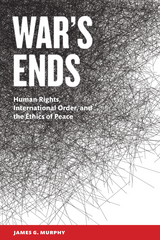
Before military action, and even before mobilization, the decision on whether to go to war is debated by politicians, pundits, and the public. As they address the right or wrong of such action, it is also a time when, in the language of the just war tradition, the wise would deeply investigate their true claim to jus ad bellum (“the right of war”). Wars have negative consequences, not the least impinging on human life, and offer infrequent and uncertain benefits, yet war is part of the human condition.
James G. Murphy’s insightful analysis of the jus ad bellum criteria—competent authority, just cause, right intention, probability of success, last resort, and proportionality—is grounded in a variety of contemporary examples from World War I through Vietnam, the "soccer war" between Honduras and El Salvador, Afghanistan, and the Middle East conflict. Murphy argues persuasively that understanding jus ad bellum requires a primary focus on the international common good and the good of peace. Only secondarily should the argument about going to war hinge on the right of self-defense; in fact, pursuing the common good requires political action, given that peace is not simply the absence of violence. He moves on to demonstrate the interconnectedness of the jus ad bellum criteria, contending that some criteria depend logically on others—and that competent authority, not just cause, is ultimately the most significant criterion in an analysis of going to war. This timely study will be of special interest to scholars and students in ethics, war and peace, and international affairs.
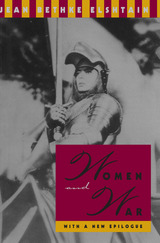
READERS
Browse our collection.
PUBLISHERS
See BiblioVault's publisher services.
STUDENT SERVICES
Files for college accessibility offices.
UChicago Accessibility Resources
home | accessibility | search | about | contact us
BiblioVault ® 2001 - 2025
The University of Chicago Press



